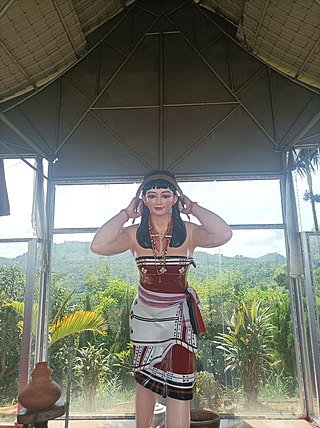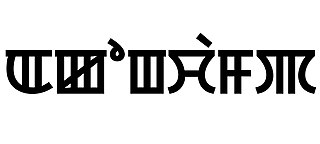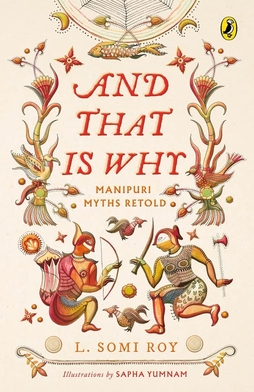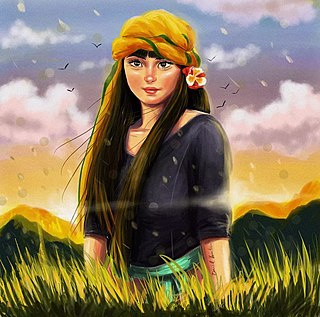
The Tangkhul people, also known as the Tangkhul Naga, are a Tibeto-Burmese ethnic group living in the Indo–Mayanmar border area, occupying the Ukhrul district and Kamjong district in the Northeast Indian state of Manipur, and in parts of neighboring Myanmar. Despite this international border, many Tangkhul have continued to regard themselves as "one nation". The name "Tangkhul" is originated from the Meitei language words, "Tang" meaning "scarce" and "Khul" meaning "village" respectively. According to another theory of origin, the term "Tangkhul" is derived from "Thankhul", meaning "Than village" in Meitei language.

Imoinu or Emoinu is a goddess associated with household, hearth, family, fireplace, kitchen, wealth, peace and prosperity in Meitei mythology and religion of Ancient Kangleipak. She is frequently associated with Leimarel Sidabi. She is regarded as one of the incarnations or representations of goddess Leimarel Sidabi.

Leimarel Sidabi or Leimalel Sitapi is a goddess in Meitei mythology and the religion of Ancient Kangleipak. She is the highest female divinity in the Meitei pantheon. She is the goddess of earth, of nature and the household. She is revered as the mother of every living being in the universe.

Panthoibi, also known as Nongpok Leima, is a goddess associated with civilization, courage, fertility, handicraft, love, victory, warfare and wisdom in the mythology and religion of Ancient Kangleipak. She is a consort of the God Nongpok Ningthou. She is considered to be one of the divine incarnations of Leimarel Sidabi and is also identified as a form of Goddess Nongthang Leima. She is worshipped mainly by the Meitei people in Manipur, Assam, Tripura, Bangladesh and Myanmar.

Irai Leima or Ireima is a goddess in Meitei mythology and religion (Sanamahism) of Ancient Kangleipak. She is the goddess and the divine female personification of water and aquatic life. She is also considered to be the incharge of the diseases.

Phouoibi Shayon, also simply known as Phouoibi, is a 2017 Indian Meitei language mythological film, about goddess Phouoibi and other celestial fairies who came down to earth to prosper the human civilization. The film is directed by O. Samananda, starring Lilabati, Kaiku Rajkumar and Gokul Athokpam, under the collaboration of Kanglei Movies World and Sergey Film Production.

Phou-oibi, the Rice Goddess is a 2013 Meitei language ballad opera, based on the story of goddess Phouoibi, adapted from Meitei mythology and folklore, performed by the Laihui Ensemble from Manipur, India, as a part of the "Tapestry of Sacred Music 2013" programme, held at the Esplanade in Singapore.

Haoreima or Haoleima is a goddess of tragic love and separation in Meitei mythology and religion of Ancient Kangleipak. According to some legends, she was a woman from the hills, who was killed while arranging to meet her lover, and turned into a tortured spirit. She is regarded as an incarnation of Goddess Panthoibi. She is also identified with goddess Nongthang Leima. She is also worshipped as goddess Ireima. She is one of the most revered Meitei goddesses, though she is of Tangkhul origin.

Phouoibi (Fouoibi) or Phouoipi (Fouoipi) or Phouleima (Fouleima) or Phoureima (Foureima) is the goddess and the female personification of the agriculture, crops, fertility, grains, harvest, paddy, rice and wealth in Meitei mythology and religion of Ancient Kangleipak (early Manipur). She is the lover of Akongjamba, a hero in ancient legends. But fate does not permit the lovers to unite. So, Phouoibi and Akongjamba reincarnated in the legends. She was sent by Thangching (Thangjing) to Kege Moirang (Keke Moilang) kingdom to prosper the human world. The legends of her love with Akongjamba were believed to be enacted by Thangching (Thangjing) as a part of the Epic cycles of incarnations (Moirang Saiyon) of the Moirang Kangleirol legends.

Lemlei Ngaleima or Ngareima is the goddess and the divine female personification of the fishes and the aquatic life in Meitei mythology and religion (Sanamahism) of Ancient Manipur. She is a sister of the goddesses, Phouoibi, Thumleima and Ereima (Ireima).

Noinu Thumleima or Thumkhong Lairembi is the goddess of salt and salt wells in Meitei mythology and religion of ancient Manipur. She is a sister of the goddesses, Phouoibi (Phouleima), Ngaleima and Ereima (Ireima). People pray to her so there will be enough salt. Salt is an important part of the human diet.

Akongjamba was a nobleman of a King in Ancient Moirang in Meitei mythology and folklore. He was a lover of the harvest Goddess Phouoibi, but fate did not permit the lovers to unite, so they reincarnated. The lives of the two legendary lovers were believed to be enacted by Thangjing as a part of the Epic cycles of incarnations.

Thangching or Thangjing is a primordial deity in Meitei mythology and religion of Ancient Kangleipak. He is the ruling deity of the Moirang dynasty of Ancient Moirang. He rules supreme on the banks of the landlocked sea, Loktak lake. He is one of the four cardinal Umang Lais. The guardianship of the south western direction is alluded to Thangjing and the other directions to Koubru, Marjing and Wangbren.

Phou Ningthou is a deity in Meitei mythology and religion (Sanamahism) of Ancient Kangleipak. He is the God and the divine male personification of the agriculture, crops, fertility, grains, harvesting, paddy, rice and wealth. He is the consort of Phouoibi (Phouleima), the goddess of crops and agricultural fertility.

And That Is Why... Manipuri Myths Retold is a children's book based on 12 stories from the Meitei mythology of Manipur, written by L. Somi Roy and published by Penguin Random House India. It was launched by Member of Parliament Rajya Sabha and titular King of Manipur Leishemba Sanajaoba at the palace compound, Imphal on 21 June 2021. The stories are adaptations of tales found in the puyas.

In Meitei mythology and folklore, the epic cycles of incarnations in Moirang is a cyclic epic of seven incarnations of two divine lovers in the kingdom of Moirang in the realm of Ancient Kangleipak.

The Phouoibi Waron or the Phouoibi Warol is a Medieval Indian Meitei text (Puya) written in a period between 13th and 14th century AD. It deals with the life story of the lovers of Phouoibi, the goddess of agricultural crops and harvest in Meitei mythology and religion (Sanamahism).

Women have significant roles in different elements of Meitei culture, including but not limited to Meitei dances, Meitei festivals, Meitei folklore, Meitei folktales, Meitei literature, Meitei mythology, Meitei religion, etc.












